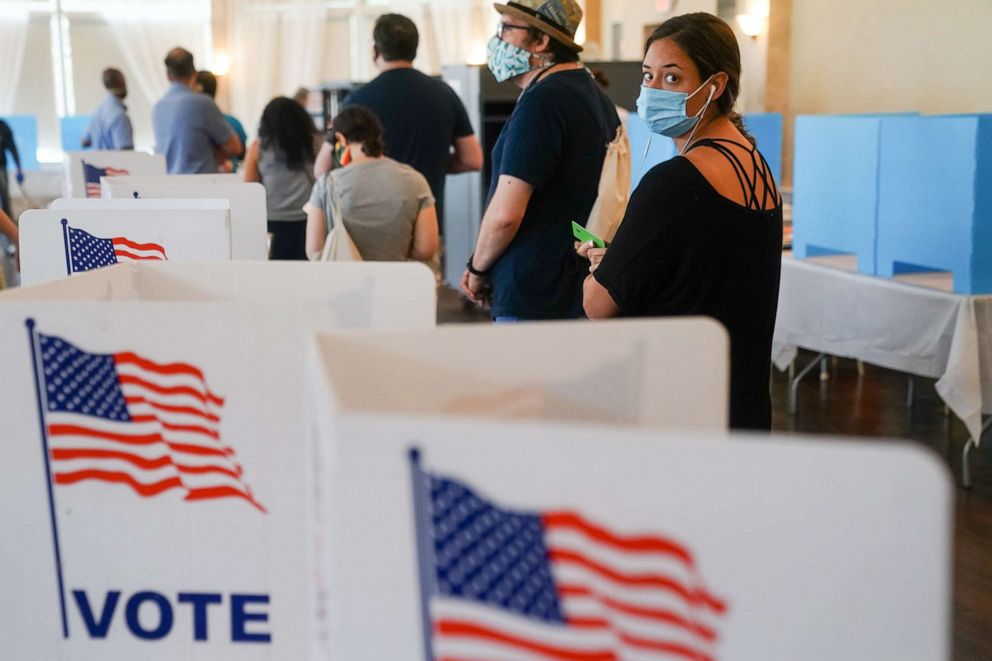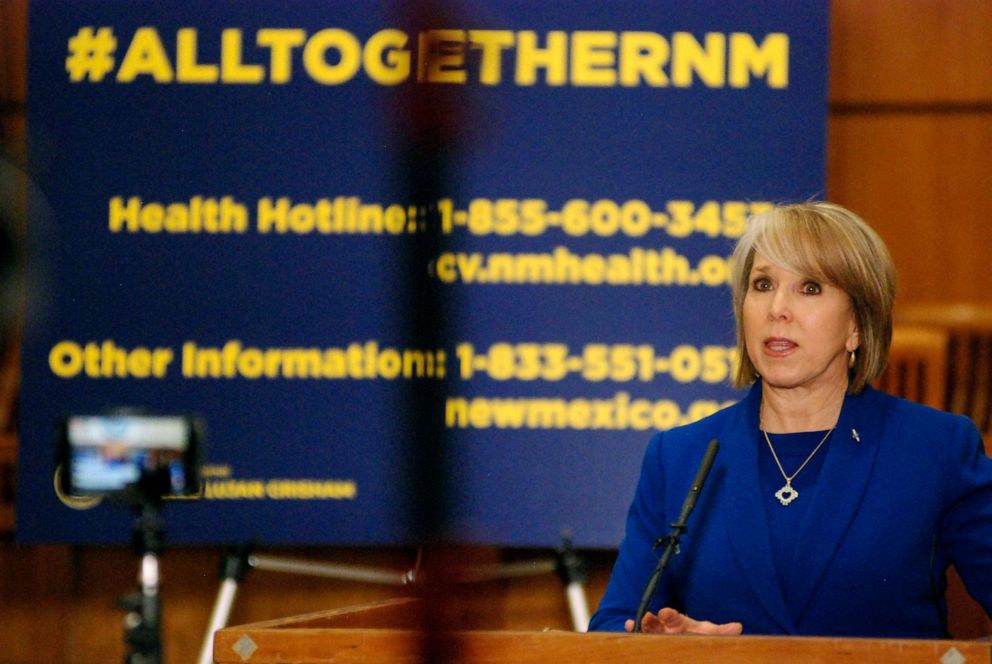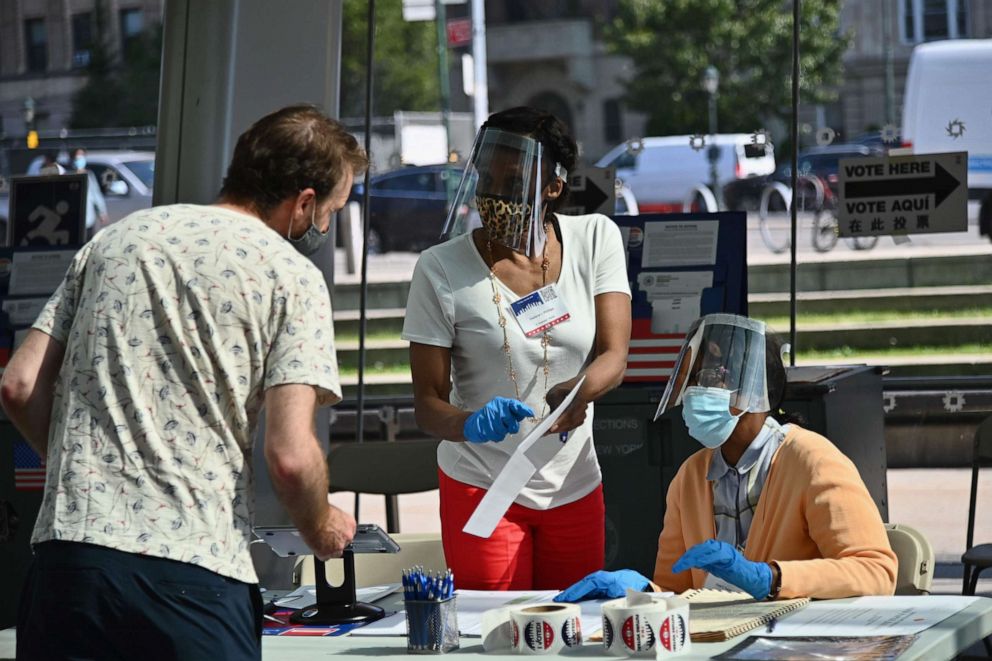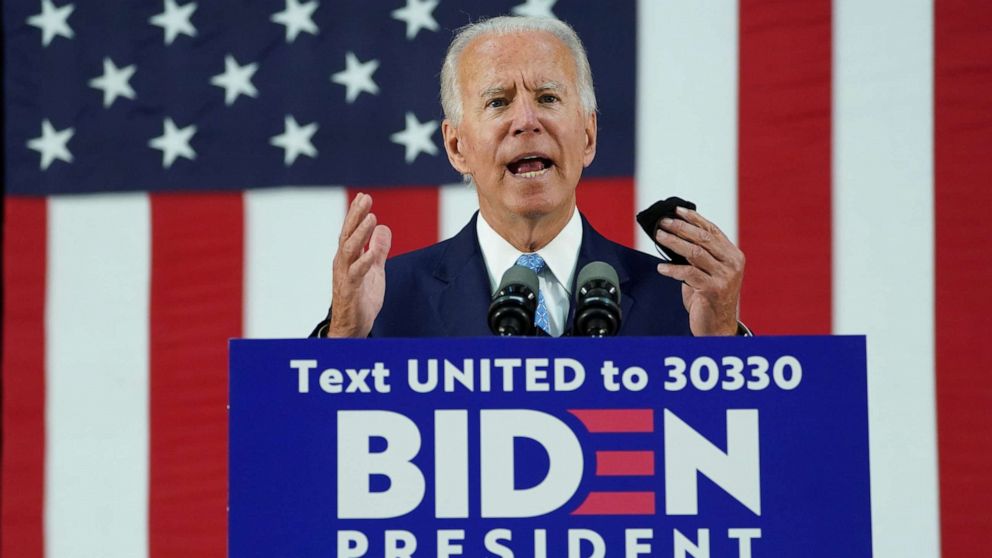How a running mate, diverse campaign could help Biden with Latino voters
At a moment of national reckoning over systemic racism brought to light by both the impact of the COVID-19 and police brutality, former Vice President Joe Biden is facing increasing calls to pick a woman of color as his running mate. Much of the attention has focused on the black women on his short list, but some strategists and Latino leaders want to make sure that the campaign is also seriously considering qualified Latina candidates.
While Biden’s reported shortlist for vice president is arguably the most diverse in presidential history, his campaign only appears to be vetting one prominent Latina candidate for the role.
In interviews with ABC News, more than half-a-dozen Latino activists, Democratic Party leaders, and operatives said that tapping a Latina running mate would put Biden in a strong position to win the overwhelming support of voters poised to become the largest nonwhite voting bloc in November.
They argue it will improve his importance with a key demographic with whom he struggled in the primary and is the second-fastest growing group in the United States.
And regardless of who Biden picks to join his ticket, they want to ensure that the diverse Latino population also has a strong voice in his campaign.
“The Latino vote is the road to the White House,” said Rep. Sylvia Garcia, D-Texas, a prominent Biden supporter. “It’s going to be a very important and critical part of his campaign strategy.”
Room to improve with Latinos
While Biden has a wide lead over Trump among Latinos - 59%-39%, according to a June PBS/NPR/Marist College poll - he still trails Hillary Clinton and former President Barack Obama, who won 66% and 71% of the Latino vote in 2016, and 2012, respectively, according to Pew.
He also lost their vote to Sanders in the Iowa and Nevada caucuses and Texas primary, but improved on his numbers in Florida and pulled even with Sanders in Arizona as the party coalesced around his campaign.
With 32 million Latinos eligible to vote in November, Latino leaders say the selection of a Latina running mate could help Biden improve both his share of the Latino vote and propel more Latinos - for years considered a sleeping demographic giant by pollsters - to the polls.
Roughly 48% of eligible Latinos voted in 2016, compared to 59.6% of blacks and 65.3% of whites, according to Pew. Overall, 12.7 million Latinos voted in 2016, compared to 11.2 million in 2012.
“We registered a lot of Latinos in 2016, but we took for granted that people were going to come out,” said Nathalie Reyes, the president and CEO of Latino Victory. “When Latinos are on the ballot, Latinos do come out and vote, and so obviously that would be really important to mobilize the Latino community around Vice President Biden.”
Latino voters, who are also among the youngest racial and ethnic groups in the country, could shape the results in a number of battleground states.

“These are new voters, these are voters who have come up through a lot of hard hardship, they've experienced a lot of alienation, particularly with this current administration and they're galvanized to do something about it,” said Paul Cuadros, an associate professor at the University of North Carolina at Chapel Hill and co-founder of the University’s Latino educational and cultural center.
In Arizona and Florida, Latinos make up between 20-25% of all eligible voters, and could also play a key role in Wisconsin, Michigan and Pennsylvania, where Trump won in 2016 by less than 80,000 votes combined.
Capturing the Latino vote is of course not a one size fits all approach, in Arizona, for example, Biden performed better with older Hispanic voters while Sanders did well with younger ones. And Republicans have traditionally enjoyed the support of the Cuban-American community in Florida, where Trump lost the Latino vote but won 54% of the Cuban vote in 2016. Nationwide, Trump received roughly 29% of the Latino vote in 2016, in line with Romney’s 27% in 2012.
New Mexico governor under consideration
New Mexico Gov. Lujan Grisham, a border state governor, former member of Congress and New Mexico health secretary, is being vetted by the Biden campaign for vice president, according to sources familiar with the process. But she may be the only Latina under consideration, after Sen. Catherine Cortez Masto of Nevada withdrew her name from the process in May.
Grisham's executive experience and handling of the COVID-19 pandemic, criminal justice reform and immigration would make her a well-rounded pick, experts and her supporters told ABC News.
“That's a nice balance of experience being an executive and running a state and dealing with all kinds of issues in terms of running a state,” said Cuardos. “As well as being a fresh face for a particular community.”
Grisham, who declined an interview request through a spokesperson, has been less public about her interest in the role than some of the other candidates.
“She’s been in conversations with the campaign about how she can best support the campaign, boost turnout and ensure a Democratic victory, and those conversations are ongoing,” press secretary Nora Meyers Sackett told ABC News.
Domingo Garcia, the president of the League of United Latin American Citizens, said her selection would be a “game-changer” with Latino voters, and expressed frustration that her potential candidacy had not gained more attention.
“It’s almost like a token name to make sure that there’s at least one Latina in the mix,” he said.
For Tania Unzueta Carrasco, co-founder and political director of progressive Latino organizing group Mijente, Biden picking a Latina for vice president isn’t a priority. She said stances issues like immigration and criminal justice reform are more important.
“I actually would much rather have someone who's good on positions than someone who was Latina that doesn’t have the values we need them to have,” said Unzueta Carrasco. “ I would be excited for someone like Stacey Abrams, I'd be very disappointed with someone like Kamala Harris. And I've been paying attention more to that than whether the person is Latino or not.”
Biden’s campaign is also vetting, among others, Sens. Kamala Harris of California, Elizabeth Warren of Massachusetts and Tammy Duckworth of Illinois, along with Reps. Val Demings of Florida and Karen Bass of California.
Susan Rice, who served in the Obama White House as the president’s national security adviser, is also thought to be under consideration.
Prominent Black Democrats have argued that naming an African-American woman as his running mate could help Biden improve his standing even further with Black voters, who resuscitated his primary campaign in South Carolina and boost turnout in several key Midwestern and southern states in November.
“This choice is going to be taking place in a moment of racial reckoning regarding this country’s treatment of African-Americans, and that’s just a reality that he’s going to have to speak to,” Steve Philips, a Democratic donor and founder of Democracy in Color, told ABC News.

The Biden campaign declined to comment on the vice-presidential selection process.
“It's the smartest strategic move that could be made with the vice presidential pick just based out of pure need,” Chuck Rocha, a Democratic strategist who served as a senior adviser to Bernie Sanders’s presidential campaign, told ABC News about a Latina running mate.
Henry Cisneros, who served as secretary of Housing and Urban Development under President Bill Clinton, and was vetted by Walter Mondale’s presidential campaign in 1984, said Biden should also consider how the selection of a running mate could impact every part of his coalition.
“You have to think about what would African-Americans voters say about that, progressive voters say about that, depending on the person,” he said.
Campaign staff and policy can also help reach Latino voters
Outside his selection of a running mate, Latino leaders told ABC News that Biden can also galvanize voters by focusing on issues important to their communities, and by putting together a diverse campaign staff.
“There are other ways that the vice president can make the case to Latinos and they are speaking to the specific issues related to immigration, related to education, related to jobs and wages that really are the top priorities for the Latino community,” said Cisneros, the former HUD secretary.
Rep. Tony Cárdenas, the chairman of BOLD PAC, the Congressional Hispanic Caucus’ campaign arm, pointed to Rocha’s role on the Sanders campaign as one reason why the Vermont senator outperformed Biden with Latino voters early in the primary.
“Bernie Sanders proved it’s not rocket science, it’s real simple. You hire and empower a culturally competent individual, and that person continues to hire and empower others who are culturally competent when it comes to the Latino vote,” Cárdenas said.
“Who’s in the room [where] the actual power sits, like I was with Bernie?” said Rocha. “That's when you know you can really make social impact and change in a campaign.”
“I do think that there needs to be more Latinos in his campaign in positions of power and I would urge the campaign to work with Latinx people who are doing community organizing,” said Unzueta Carrasco.
In an interview with ABC News, Biden senior adviser Julie Chávez Rodríguez, the granddaughter of the late labor and civil rights leader César Chávez who also served in the Obama White House, said she and senior adviser Cristóbal Alex are “in the room” with campaign leadership and the former vice president, and that the campaign has worked to include Latino staff at every level.
More than one-third of Biden's staff are people of color, and a majority of his team are women, according to data released by the campaign last month.
“We are growing the organization in ways that, frankly, during the primary there were a lot more limited resources and a limited ability to do that,” she said, noting that the campaign has named Latina state directors in Arizona and Nevada.

Biden recently launched a Latino Leadership Committee, led by former Colorado senator Ken Salazar, that includes former Obama Labor Secretary Hilda Solis, Cárdenas, and other prominent Latino surrogates.
His campaign has also started outreach to Hispanic voters with highly sophisticated ads, tailored to certain areas based on ethnicity and specific communities.
“Understanding all the sort of complexities and diversities of our community is going to be so key to really tapping into what is going to motivate them to vote,” said Chávez Rodriguez, who joined the campaign in May.
She said the campaign’s decision to organize a coalitions department - focused on outreach to different groups of voters, including ethnic and religious groups - together with its digital organizing would also help the campaign’s Latino outreach.
“We all are approaching this, even in the COVID era, with some cautious optimism and a vision for ways that we want to not just win an election, but empower our communities in the process,” she said.




